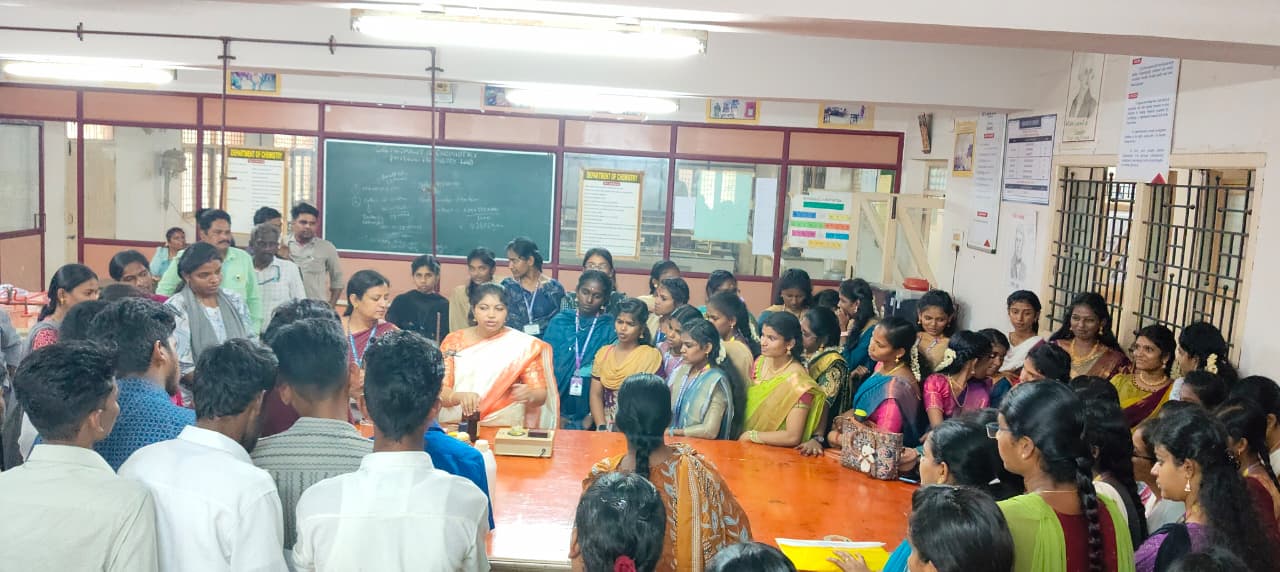
The PG and Research Departments of Biochemistry and Chemistry, J.J.College of Arts and Science (Autonomous), organized One Day National Workshop on Nanoparticle Synthesis on 03.09.2025.
In the inaugural session, Dr.J. Parasuraman, Principal, welcomed the participants and the workshop probably explored the use of nanomaterials in various sectors, such as healthcare, energy, and materials science. It was an interdisciplinary field that had great technological value and varied applications.
Dr. S.Valarselvan, Head, Department of Chemistry, defined the theme and sub-themes of the workshop and their inter-relatedness.
Dr. S.Meena, Assistant Professor, Department of Chemistry, Dayananda Sagar College of Engineering, Bangalore, delivered the inaugural address. He made out a case for greater attention to research on the various aspects of nanoparticle synthesis.
In the first technical session Dr. S.Meena, Assistant Professor, Department of Chemistry, Dayananda Sagar College of Engineering, Bangalore spoke on Binding Chemistry and Biology for Sustainable Nanoparticle synthesis, He stressed that a nanoparticle synthesis creates nanoscale materials by using top-down methods, which break down bulk materials and bottom-up methods, which build particles from atoms or molecules. Common techniques include physical methods, chemical methods and green synthesis using biological agents to produce eco-friendly nanoparticles. The chosen method depends on the desired control over the nanoparticles size, shape, and composition for specific applications. In the second technical session Dr.J.Joseph Sahayarayan, Assistant Professor, Department of Bioinformatics, Alagappa University, Karaikudi, spoke on Green Nanoparticles Synthesis for Life Threatening Diseases. He spoke on the Green synthesis is an eco-friendly approach that uses plant extracts or microorganisms to produce nanoparticles from metal ions, with applications in treating life-threatening diseases like cancer and infections. These nanoparticles, particularly silver nanoparticles , have shown antimicrobial, anticancer, and antioxidant properties by interfering with DNA and protein synthesis in pathogens and tumor cells. The process involves mixing plant extracts with metal salt solutions, where plant compounds act as reducing and stabilizing agents to form stable nanoparticles. This method is advantageous due to its sustainability, cost-effectiveness, and minimal use of toxic chemicals, offering a promising alternative to traditional synthesis techniques. In the next third session, after lunch break Dr. S.Meena, Assistant Professor, Department of Chemistry, Dayananda Sagar College of Engineering, Bangalore, hands on session Wet lab Skills for Nanoparticle Synthesis: Chemical Protocols. She demonstrated the common techniques include physical methods, chemical methods and green synthesis using biological agents to produce eco-friendly nanoparticles.
The conference was attended by 90 students of Biochemistry and Chemistry including 25 from other institutions. In the valedictory session Dr.S.Valarselvan, Head, Department of Chemistry, J.J.College of Arts and Science (Autonomous), Pudukkottai, welcomed the audience and guests. All participants were issued certificates. Dr.S.Kanitha, Head, Department of Biochemistry, J.J.College of Arts and Science(Autonomous), Pudukkottai, proposed the vote of thanks.